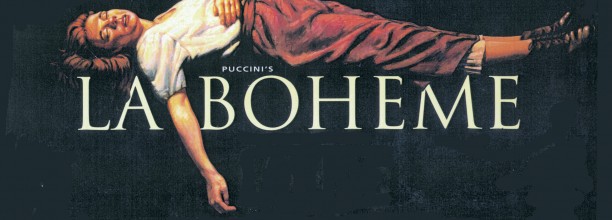
The Opera
La Boheme is an opera in four acts by Italian composer Giacomo Puccini, to an Italian libretto by Luigi Illica and Giuseppe Giacosa, based on ‘Scenes de la vie de Boheme’ by Henri Murger.
Puccini’s musical genius is confirmed in La Boheme, which is often regarded as his first foray into verismo and a post-romantic operatic world. The composition also appears open to the symphonic development adapted by the German masters, particularly Wagner, with its thematic reminiscence similar to Wagner’s leitmotifs.
Four poor bohemians are living in a rundown loft in the Latin quarter of Paris in the 1830’s. Tragic and heartfelt with elements of comedy, La Bohème tells the story of Rodolfo, a poet and his friends a painter, a musician and a philosopher. Mimì, a fragile seamstress who lives next door, falls in love with Rodolfo. He feigns jealousy in an effort to dissuade her love, believing someone wealthier would be able to help her get better. Mimì’s health rapidly declines and finally her friends gather and watch on helplessly as she succumbs, her true love at her side.
Act 1
Paris sometime around the 1830’s:
In the garret
Marcello is painting, Rodolfo gazes out of the window. They complain of the cold. In order to keep warm, they burn one of Rodolfo’s manuscripts. Coline, the philosopher, enters shivering with cold and unhappy at not being able to pawn any books. Schaunard, the musician arrives with food, wine and cigars having secured some money from an unusual job playing violin to a parrot for an eccentric Englishman. The table is being hastily set when Schaunard urges them to halt, insisting they must save the food for the days ahead: tonight they will all celebrate at Cafe Momus, and he will pay.
The friends are interrupted by Benoît, the landlord, who arrives to collect the rent. They flatter him and ply him with wine. In his drunkenness, he begins to boast of his amorous adventures, but also reveals he is married, they thrust him from the room in comic, moral indignation, slyly getting out of coughing up the rent money.
Marcello, Schaunard and Coline go out, Rodolfo remains behind alone in order to finish an article he is writing, promising to join his friends soon. There is a knock at the door. It is a girl who lives in a nearby room in the building. Her candle has blown out and she asks Rodolfo to light it. She begins to feel faint and Rodolfo helps her to a chair, offering her a glass of wine. She thanks him. After a few minutes, she says that she is feeling better and must go. But as she turns to leave, she realizes that she has lost her key. The pair’s candles both go out in a sudden draught and they stumble in the dark. Rodolfo finds the key and pockets it, feigning innocence. He takes her cold hand (Che gelida manina – “What a cold little hand”) and tells her of his life as a poet, then asks her to tell him more about her life. The girl says her name is Mimì (Sì, mi chiamano Mimì – “Yes, they call me Mimì”), and describes her simple life as an embroiderer. Impatiently, the waiting friends call Rodolfo. He answers and turns to see Mimì bathed in moonlight (duet, Rodolfo and Mimì: O soave fanciulla – “Oh lovely girl”). They realize that they have fallen in love. Rodolfo suggests remaining at home with Mimì, but she decides to accompany him to the Cafe Momus. As they leave, they sing of their newfound love.
Act 2
Quartier Latin
A crowd, including children, has gathered with street sellers announcing their wares (chorus: Aranci, datteri! Caldi i marroni! – “Oranges, dates! Hot chestnuts!”). The friends arrive; Rodolfo buys Mimì a bonnet from a vendor, while Colline buys a coat and Schaunard a horn. Parisians gossip with friends and bargain with the vendors; the children of the streets clamor to see the wares of Parpignol, the toy seller. The friends enter the Cafe Momus.
As the men and Mimì dine at the cafe, Musetta, formerly Marcello’s sweetheart, arrives with her rich (and elderly) government minister admirer, Alcindoro, whom she is tormenting. It is clear she has tired of him. To the delight of the Parisians and the embarrassment of her patron, she sings a risqué song (Musetta’s waltz: Quando me’n vo’ – “When I go along”), hoping to reclaim Marcello’s attention. The ploy works; at the same time, Mimì recognizes that Musetta truly loves Marcello. To be rid of Alcindoro for a bit, Musetta pretends to be suffering from a tight shoe and sends him to the shoemaker to get her shoe mended. Alcindoro leaves, and Musetta and Marcello fall rapturously into each other’s arms.
The friends are presented with their bill. Schaunard’s purse has gone missing and no one else has enough money to pay. The sly Musetta has the entire bill charged to Alcindoro. The sound of a military band is heard, and the friends leave. Alcindoro returns with the repaired shoe seeking Musetta. The waiter hands him the bill and, dumbfounded, Alcindoro sinks into a chair.
Act 3
At the toll gate at the Barrière d’Enfer (late February)
Peddlers pass through the barriers and enter the city. Mimì appears, coughing violently. She tries to find Marcello, currently living in a little tavern where he paints signs for the innkeeper. She tells him of her hard life with Rodolfo, who abandoned her the night before, and of Rodolfo’s terrible jealousy (O buon Marcello, aiuto! – “Oh, good Marcello, help me!”). Marcello tells her that Rodolfo is asleep inside, and expresses concern about Mimì’s cough.
Rodolfo wakes up and comes out looking for Marcello. Mimì hides and overhears Rodolfo first telling Marcello that he left Mimì because of her coquettishness, but finally confessing that his jealousy is a sham: he fears she is slowly being consumed by a deadly illness (most likely tuberculosis, known by the catchall name “consumption” in the nineteenth century). Rodolfo, in his poverty, can do little to help Mimì and hopes that his pretended unkindness will inspire her to seek another, wealthier suitor (Marcello, finalmente – “Marcello, finally”). Out of kindness towards Mimì, Marcello tries to silence him, but she has already heard all. Her weeping and coughing reveal her presence, and Rodolfo hurries to her.
Musetta’s laughter is heard and Marcello goes to find out what has happened. Mimì tells Rodolfo that she is leaving him, and asks that they separate amicably (Mimì: Donde lieta uscì – “From here she happily left”); but their love for one another is too strong for the pair to part. As a compromise, they agree to remain together until the spring, when the world is coming to life again and no one feels truly alone.
Meanwhile, Marcello has found Musetta, and the couple quarrel fiercely about Musetta’s flirtatiousness: an antithetical counterpoint to the other pair’s reconciliation (quartet: Mimì, Rodolfo, Musetta, Marcello: Addio dolce svegliare alla mattina! – “Goodbye, sweet awakening in the morning!”).
Act 4
Back in the garret (some months later)
Marcello and Rodolfo are working but find themselves distracted as they begin to talk about their former girlfriends, who have left them and found wealthy lovers. Rodolfo has seen Musetta in a fine carriage and Marcello has seen Mimì dressed like a queen. The men both express their nostalgia (duet: O Mimì, tu più non torni – “O Mimì, will you not return?”).
Schaunard and Coline arrive with a very frugal dinner and they all parody eating a plentiful banquet, dance together and sing, before Schaunard and Colline engage in a mock duel. Musetta suddenly appears; Mimì, who took up with a wealthy viscount after leaving Rodolfo in the spring, has left her patron. Musetta found her that day in the street, severely weakened by her illness, and Mimì begged Musetta to bring her to Rodolfo.
Mimì, haggard and pale, is assisted onto a bed. Briefly, she feels as though she is recovering. Musetta and Marcello leave to sell Musetta’s earrings in order to buy medicine, and Coline leaves to pawn his overcoat (Vecchia zimarra – “Old coat”). Schaunard leaves with Coline to give Mimì and Rodolfo some time together. Mimì tells Rodolfo that her love for him is her whole life (aria/duet, Mimì and Rodolfo: Sono andati? – “Have they gone?”). To Mimì’s delight, Rodolfo presents her with the pink bonnet he bought her, which he has kept as a souvenir of their love.
They remember past happiness and their first meeting—the candles, the lost key. Suddenly, Mimì is overwhelmed by a coughing fit. The others return, with a gift of a muff to warm Mimì’s hands and some medicine. Mimì gently thanks Rodolfo for the muff, which she believes is a present from him, reassures him that she is better and falls asleep. As Musetta prays, Mimì dies. Schaunard realizes that Mimì has died. Rodolfo becomes aware that something is wrong. He rushes to the bed, calling Mimì’s name in anguish, and weeps helplessly.
The Missing Act
In 1957 the librettist, Illica’s widow died and his papers were given to the Parma Museum. Among them was the full libretto to La bohème. It was discovered that the librettists had prepared an act which Puccini decided not to use in his composition. It is noteworthy for explaining Rodolfo’s jealous remarks to Marcello in act 3.
The “missing act” is located in the timeline between the Café Momus scene and act 3 and describes an open-air party at Musetta’s dwelling. Her protector has refused to pay further rent out of jealous feelings, and Musetta’s furniture is moved into the courtyard to be auctioned off the following morning. The four Bohemians find in this an excuse for a party and arrange for wine and an orchestra. Musetta gives Mimì a beautiful gown to wear and introduces her to a Viscount. The pair dances a quadrille in the courtyard, which moves Rodolfo to jealousy. This explains his act 3 reference to the “moscardino di Viscontino” (young fop of a Viscount). As dawn approaches, furniture dealers gradually remove pieces for the morning auction.
La bohème is scored for:
Woodwind: 2 flutes, piccolo, 2 oboes, cor anglais, 2 clarinets in A and B flat, bass clarinet in A and B flat, 2 bassoons
Brass: 4 horns in F, 3 trumpets in F, 3 trombones, bass trombone
Percussion: timpani, snare drum, triangle, cymbals, bass drum, xylophone, glockenspiel, chimes
Strings: harp, violins I, II, viola, cello, double bass


